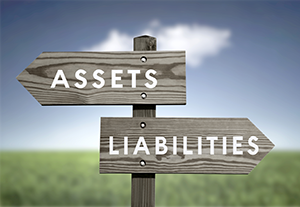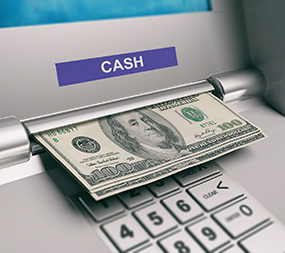How to Shield Your Money From Inflation
 Recent high inflation rates are driving up the price for almost everything and eroding the value of your money. With varying opinions on the potential duration of the current inflation surge, it’s important to understand the causes and how you can protect your money.
Recent high inflation rates are driving up the price for almost everything and eroding the value of your money. With varying opinions on the potential duration of the current inflation surge, it’s important to understand the causes and how you can protect your money.
Possible causes of this inflation
While the root causes of inflation are not always easy to identify, the premise is simple – prices are going up for goods and services. This is often because demand is higher than supply. Here are some of the basic drivers of today’s inflation.
- The demand-pull situation. Demand for a product increases but the supply remains the same. Think of a vendor selling ponchos at a state fair. If it rains, demand is going to spike and fair-goers are willing to pay up to keep dry. This situation is rampant during the pandemic, as we all see runs on things like toilet paper and hand sanitizer. And now we are seeing pent-up demand being released, as some of the pandemic restrictions are eased. An example of this is popular vacation locations being all booked in advance.
- The cost-push situation. Demand stays constant but supply is reduced. An example of this is a lower-yield crop season when a major drought hits a region. Consumers still want their dinner salads, but lettuce is sparse. So, retailers charge more to cover their increased costs. Or when paper mills switched production to handle higher toilet paper demand, pulp used for paper and packaging had supply reductions creating a shortage which increased their prices.
- Factoring in the money supply. The more money there is available to spend (high money supply), the more the demand on all goods and services goes up. This is being manifested in wage increases as employers are having a hard time filling jobs and is also the result of many of the government spending programs during the pandemic.
Ideas to protect yourself during high inflation
- Alternative savings that is NOT cash. The value of your money sitting in your wallet or in low interest bank accounts is shrinking before your eyes. The past year has seen the highest inflation rates in the last decade at 5.4%, according to the Consumer Price Index (CPI). That means if your savings account is earning 0.6%, you’ve lost 4.8% in purchasing power over the last 12 months. Get your money to work for you by considering:
- Low risk, dividend-paying stocks
- CDs, bonds and other investments with various maturities to prepare for higher rates
- Direct lending vehicles through vetted, respected facilitators
- Investing directly in property, small businesses or other tangible assets
- Invest in yourself to learn a new trade or skill
- Lock in fixed rates on debt. Inflation can be your friend if you have a low interest, fixed-rate loan. For example, inflation will tend to increase the value of your house over time, yet your monthly payment will remain the same. So borrowing money at a low fixed interest rate, while the underlying property value increases with inflation, can be a strategy to consider.
- Delay large expenditures. Do your part to reduce demand by postponing large purchases. Consider delaying the purchase of a new car, adding to your home or taking an overseas trip until demand flattens and prices come back to a normal rate.
It’s impossible to avoid the effects of high inflation altogether, but with some smart investing and the will-power to temporarily curb spending, you can reduce inflation’s impact on your personal bottom line.
Knowing your net worth and understanding how it is changing over time is one of the most important financial concepts that everyone needs to understand. This number is used by banks, mortgage companies, insurance companies and you! Your net worth impacts your credit score, which in turn impacts your interest rates and things as mundane as the amount you pay for auto insurance.
A simple definition
- Net worth is the result of taking all the things you own (assets) minus what you owe others (debts and liabilities).
- Assets include cash, bank account balances, investments, your home, vehicles or anything else that you could sell today for cash. Assets also include any businesses or business interests you own.
- Liabilities are what you owe others, such as a mortgage or car loan, and any other debt, like credit card or student loan debt.
 Your net worth changes over time, reflecting how you spend your money. For example, if you have tons of bills and spend more than you bring in, your bank account balances will be lower. If you spend a lot on your credit cards, your debt will go up. The net effect is a lower net worth.
Your net worth changes over time, reflecting how you spend your money. For example, if you have tons of bills and spend more than you bring in, your bank account balances will be lower. If you spend a lot on your credit cards, your debt will go up. The net effect is a lower net worth.
Everyone has a net worth
Yes, everyone. Even a 6-year-old with money in their piggy bank has a net worth. If your child is saving up for a bike, they will convert one asset (cash) into another asset (their new bike)!
Calculating your net worth
- Step one. Reconcile your bank accounts and loans. Try doing this every month, as these are the easiest parts of your net worth to track and calculate.
- Step two. Calculate the value of all your remaining assets. For some of your assets, such as stocks, you can go online and find the current value of the stocks you own. For other assets, you’ll have to estimate what you could sell that asset for today.
- Step three. Add up all your asset values, then subtract all your debts. What you’re left with is your net worth (and yes, your number could be negative)!
Why you should know your net worth
Knowing your net worth contributes to the big picture of your financial circumstances. Here’s why it’s beneficial to know your net worth:
- You want to apply for student loans. You’ll likely need to submit an application that details all your cash and other assets when applying for student loans. If your net worth is high enough, you may have to foot some of the tuition bill yourself.
- You want to get insurance. Some types of insurance use your credit score as part of the calculation for determining your premium payments. Knowing if you have a high net worth may help in obtaining a favorable premium amount.
- You want to diversify your investments. Certain investments are available only to individuals who have a high enough net worth.
- You want to buy a home. Banks want to see that you have plenty of cash when compared to your debts. If you have too much debt, you may need to either pay down the debt or increase your down payment.
Knowing your net worth and how to calculate it can help you achieve some of your financial goals. Please call if you’d like help calculating and understanding your net worth.
Banking tips to help you cash in
Your cash is parked. Do you know if it’s making or losing you money? For instance, letting it sit in a non-interest-bearing account is a waste of earnings potential. It’s actually losing money if you factor in inflation! Here are some ideas to help you make the most of your banked cash:
Understand your bank accounts. Not all bank accounts are created equal. Interest rates, monthly fees, minimum balances, direct deposit requirements, access to ATMs, other fees and customer service all vary from bank to bank and need to be considered. Start by digging into the details of your accounts. There may be some things you’ve been unnecessarily living with like ATM fees or monthly account charges. Once you have a handle on your current bank, conduct research on what other banks have to offer.
Know your interest rates. As a general rule, the more liquid an account, the lower the interest rate. Checking accounts offer the lowest rates, then savings accounts, which yield lower rates than CDs. Maximizing your earnings is as simple as keeping your cash in accounts with higher interest rates. The overall interest rate earned between all your accounts should be higher than the inflation rate, which is generally around 2 percent.
Make smart moves. There are a couple of things to take into account when making transfers. First, federal law allows for only six transfers from savings and money market accounts per month. Second, if you invest in longer term investments like CDs or bonds, there are penalties for withdrawing funds before the maturity date. So make sure you can live without the funds for the duration of the term.
Stay diligent. Putting together a cash plan is just the start. The key to success is to be persistent. Besides losing out on potential earnings, mismanaging your cash can result in hefty overdraft fees. The more attention you devote, the more your money will grow.